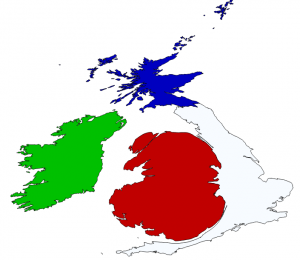Any rugby fan in the “home” countries this week has been analysing the squad announcement for this year’s British and Irish Lions tour of Australia. Warren Gatland has chosen his 37 man squad to bring down under and unsurprisingly there are quite a few Welshman in the list. Despite losing to Ireland in the first round of the Six Nations this year (yay!), Wales were able to come storming back to win the championship for the second year running.
But how much did this performance impress Warren Gatland? Well out of 37 players chosen this week, 15 are Welsh, overhauling England with 10, Ireland with 9 and Scotland with a token contribution of 3 players. Percentage-wise that’s 40.5% Welsh, 27.0% English, 24.3% Irish and only 8.1% Scottish.
To illustrate this dominance I thought it might be interesting to create a cartogram, a map in which the land area of the familiar regions has been replaced with some other variable, here the squad composition. Cartograms have become increasingly popular in the last few years, in particular to illustrate disparities on a world scale. In all these cases the comparison is inherently with the standard land area of the usual map with which we are all at least familiar.
So here is what the British Isles/these islands/British and Irish Isles looks like when transformed using the Lions 2013 Squad composition:
 Lions Squad 2013 Cartogram, created by Ian Huston. Licensed under a Creative Commons Attribution-ShareAlike 3.0 Unported License
Lions Squad 2013 Cartogram, created by Ian Huston. Licensed under a Creative Commons Attribution-ShareAlike 3.0 Unported License
As you can see Wales is disproportionately represented in the Lions squad as we might have expected. Ireland seems to be pulling about right for its size given the relative lack of distortion but clearly England is not contributing as many players as it might (not even their captain made it!).